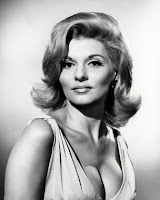 |
| William Holden as Sefton. |
The barracks' residents conclude there must be an informant hiding among them and their chief suspect is a wheeler-dealer named Sefton (William Holden). Sefton is determined to make his stay in Stalag 17 as comfortable as possible. He barters with his German captors and profits off his fellow prisoners by running gambling games (e.g., mice races) and selling moonshine (from his own still). None of his fellow soldiers like Sefton, except for the quiet Cookie, who functions as his assistant (and also serves as the film's narrator).
Convinced that Sefton is the barracks' spy, his fellow prisoners beat him severely. Proclaiming his innocence, Sefton warns the others that he will uncover the informant and seek retribution.
Made in 1953, Stalag 17 was based on the 1951 stage play written by Donald Bevan and Edmund Trzcinski, who both spent time in a World War II prisoner of war camp. Jose Ferrer directed the stage version, which starred John Ericson (in his Broadway debut) as Sefton. Two members of the supporting cast, Harvey Lembeck and Robert Strauss, repeated their roles for the film version.
 |
| Harvey Lembeck and Robert Strauss. |
 |
| Holden with Gil Stratton as "Cookie." |
Having seen Stalag 17 multiple times, the most interesting element this time around was the group dynamics. Fueled by guilt over their comrades' deaths, the barracks residents need to uncover the informant. Therefore, they hone in on the person they don't like. There is no evidence against Sefton--other than he already barters with their German captors (which would be stupid for an informant). The barracks' leader doesn't even give Sefton an opportunity to defend himself in a mock trial. A sort of mob mentality takes over, with Sefton branded as guilty and duly punished. (For this reason, Sefton's very last interaction with his fellow soldiers, near the end of the film, doesn't ring true.)
 |
| Peter Grave as a prisoner. |
Finally, less we forget, the TV series Hogan's Heroes borrowed liberally from Stalag 17, although the tone was decidedly different. Indeed, Donald Bevan and Edmund Trzcinski tried to sue the show's makers, but their lawsuit was unsuccessful.
Here's a scene from Stalag 17, courtesy of the Cafe's YouTube Channel:

























